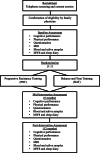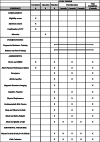Reshaping the path of vascular cognitive impairment with resistance training: a study protocol for a randomized controlled trial
- PMID: 33736706
- PMCID: PMC7971404
- DOI: 10.1186/s13063-021-05156-1
Reshaping the path of vascular cognitive impairment with resistance training: a study protocol for a randomized controlled trial
Abstract
Background: Subcortical ischemic vascular cognitive impairment (SIVCI) is the most common form of vascular cognitive impairment. Importantly, SIVCI is considered the most treatable form of cognitive impairment in older adults, due to its modifiable risk factors such as hypertension, diabetes mellitus, and hypercholesterolemia. Exercise training is a promising intervention to delay the progression of SIVCI, as it actively targets these cardiometabolic risk factors. Despite the demonstrated benefits of resistance training on cognitive function and emerging evidence suggesting resistance training may reduce the progression of white matter hyperintensities (WMHs), research on SIVCI has predominantly focused on the use of aerobic exercise. Thus, the primary aim of this proof-of-concept randomized controlled trial is to investigate the efficacy of a 12-month, twice-weekly progressive resistance training program on cognitive function and WMH progression in adults with SIVCI. We will also assess the efficiency of the intervention.
Methods: Eighty-eight community-dwelling adults, aged > 55 years, with SIVCI from metropolitan Vancouver will be recruited to participate in this study. SIVCI will be determined by the presence of cognitive impairment (Montreal Cognitive Assessment < 26) and cerebral small vessel disease using computed tomography or magnetic resonance imaging. Participants will be randomly allocated to a twice-weekly exercise program of (1) progressive resistance training or (2) balance and tone training (i.e., active control). The primary outcomes are cognitive function measured by the Alzheimer's Disease Assessment Scale-Cognitive-Plus (ADAS-Cog-13 with additional cognitive tests) and WMH progression.
Discussion: The burden of SIVCI is immense, and to our knowledge, this will be the first study to quantify the effect of progressive resistance training on cognitive function and WMH progression among adults with SIVCI. Slowing the rate of cognitive decline and WMH progression could preserve functional independence and quality of life. This could lead to reduced health care costs and avoidance of early institutional care.
Trial registration: ClinicalTrials.gov NCT02669394 . Registered on February 1, 2016.
Keywords: Cognitive Function; Exercise; Mobility; Randomized controlled trial; Resistance training; Vascular cognitive impairment; White matter hyperintensities.
Conflict of interest statement
The authors declare that they have no competing interests.
Figures
Similar articles
-
Reshaping the path of mild cognitive impairment by refining exercise prescription: a study protocol of a randomized controlled trial to understand the "what," "for whom," and "how" of exercise to promote cognitive function.Trials. 2022 Sep 9;23(1):766. doi: 10.1186/s13063-022-06699-7. Trials. 2022. PMID: 36085237 Free PMC article.
-
Aerobic exercise and vascular cognitive impairment: A randomized controlled trial.Neurology. 2016 Nov 15;87(20):2082-2090. doi: 10.1212/WNL.0000000000003332. Epub 2016 Oct 19. Neurology. 2016. PMID: 27760869 Free PMC article. Clinical Trial.
-
Aerobic exercise promotes executive functions and impacts functional neural activity among older adults with vascular cognitive impairment.Br J Sports Med. 2018 Feb;52(3):184-191. doi: 10.1136/bjsports-2016-096846. Epub 2017 Apr 21. Br J Sports Med. 2018. PMID: 28432077 Clinical Trial.
-
The role of exercise in mitigating subcortical ischemic vascular cognitive impairment.J Neurochem. 2018 Mar;144(5):582-594. doi: 10.1111/jnc.14153. Epub 2017 Sep 27. J Neurochem. 2018. PMID: 28833160 Review.
-
Does resistance training in older adults lead to structural brain changes associated with a lower risk of Alzheimer's dementia? A narrative review.Ageing Res Rev. 2024 Jul;98:102356. doi: 10.1016/j.arr.2024.102356. Epub 2024 May 31. Ageing Res Rev. 2024. PMID: 38823487 Review.
Cited by
-
Physical reserve and its underpinning functional neural networks moderate the relationship between white matter hyperintensity and postural balance in older adults with subcortical ischemic vascular cognitive impairment.Sci Rep. 2024 Jul 26;14(1):17161. doi: 10.1038/s41598-024-68050-1. Sci Rep. 2024. PMID: 39060551 Free PMC article.
-
Vascular cognitive impairment and dementia: An early career researcher perspective.Alzheimers Dement (Amst). 2022 Apr 27;14(1):e12310. doi: 10.1002/dad2.12310. eCollection 2022. Alzheimers Dement (Amst). 2022. PMID: 35496373 Free PMC article.
-
The Association of the 24-Hour Activity Cycle Profiles With Cognition in Older Adults With Mild Cognitive Impairment: A Cross-Sectional Study.J Gerontol A Biol Sci Med Sci. 2024 Jul 1;79(7):glae099. doi: 10.1093/gerona/glae099. J Gerontol A Biol Sci Med Sci. 2024. PMID: 38642387 Free PMC article.
-
Physical activity may protect myelin via modulation of high-density lipoprotein.Alzheimers Dement. 2025 Feb;21(2):e14599. doi: 10.1002/alz.14599. Alzheimers Dement. 2025. PMID: 39989020 Free PMC article.
-
24-hour activity cycle behaviors and gray matter volume in mild cognitive impairment.Alzheimers Dement. 2025 Jul;21(7):e70496. doi: 10.1002/alz.70496. Alzheimers Dement. 2025. PMID: 40693459 Free PMC article.
References
-
- World Health Organization, Alzheimer's Disease International . Dementia: a public health authority. 2012.
-
- Rockwood K, Wentzel C, Hachinski V, Hogan DB, MacKnight C, McDowell I. Prevalence and outcomes of vascular cognitive impairment. Vascular Cognitive Impairment Investigators of the Canadian Study of Health and Aging. Neurology. 2000;54(2):447–451. - PubMed
-
- Desmond DW, Erkinjuntti T, Sano M, Cummings JL, Bowler JV, Pasquier F, et al. The cognitive syndrome of vascular dementia: implications for clinical trials. Alzheimer Dis Assoc Disord. 1999;13(Suppl 3):S21–S29. - PubMed
-
- Erkinjuntti T, Bowler JV, DeCarli CS, Fazekas F, Inzitari D, O’Brien JT, et al. Imaging of static brain lesions in vascular dementia: implications for clinical trials. Alzheimer Dis Assoc Disord. 1999;13(Suppl 3):S81–S90. - PubMed
-
- Pantoni L, Leys D, Fazekas F, Longstreth WT, Jr, Inzitari D, Wallin A, et al. Role of white matter lesions in cognitive impairment of vascular origin. Alzheimer Dis Assoc Disord. 1999;13(Suppl 3):S49–S54. - PubMed
Publication types
MeSH terms
Associated data
Grants and funding
LinkOut - more resources
Full Text Sources
Other Literature Sources
Medical



